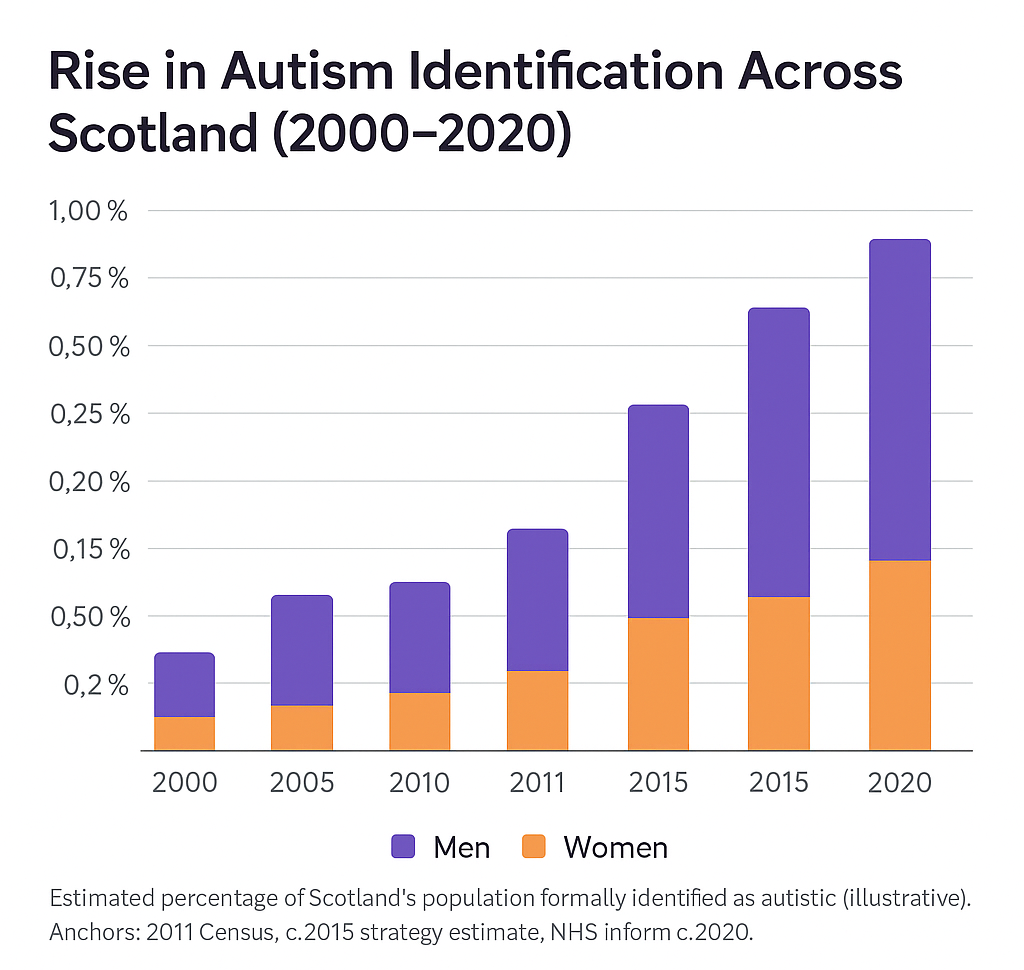Across Scotland, more adults are beginning to recognise that autism does not always look the same in everyone. For many, the journey to understanding starts later in life, when long-standing traits begin to make sense under the lens of Autism Spectrum Disorder (ASD). At Enlightened Minds, we support people across Scotland who suspect they may be autistic and are seeking clarity, compassion, and practical support.
Autism in Scotland today
Autism, or Autism Spectrum Disorder (ASD), is a neurodevelopmental difference that affects how a person experiences the world, processes information, and interacts with others. It is estimated that around 1 in 100 people in Scotland are on the autism spectrum, though recent figures suggest this number could be higher as awareness grows and diagnostic pathways improve. Despite this, many adults; especially women, remain undiagnosed or misdiagnosed for much of their lives.
In Scotland, the understanding of autism has evolved significantly. Diagnostic services are now available through both the NHS and private providers such as Enlightened Minds. However, waiting times through NHS Scotland can still be lengthy, often exceeding 12 months for adults. As a result, many people are choosing to seek private assessments to gain timely answers and access appropriate support sooner.

How autism presents differently in men and women
For decades, autism was primarily studied and diagnosed in boys and men, which shaped how the condition was defined. Research now shows that while men and women share the same core traits, differences in social communication, sensory processing, and repetitive behaviours, the way these appear can vary widely between genders. Understanding these nuances is key to better diagnosis and support.
Men with autism often present in more recognisable ways. They may display obvious social communication difficulties, appear rigid in routines, or focus intensely on specific interests such as technology, transport, or gaming. They may struggle to interpret social cues, maintain eye contact, or understand unspoken rules in conversation. Many men describe feeling disconnected or “out of sync” in group settings, despite wanting to connect.
Women with autism tend to mask their differences more effectively, often by mimicking social behaviour or using learned scripts to navigate conversations. They may appear sociable or empathetic but feel mentally exhausted by the effort to maintain this performance. As a result, many women go undiagnosed until adulthood, often after years of being treated for anxiety, depression, or personality disorders. Women are also more likely to internalise stress, leading to emotional burnout or sensory overload that can appear as sudden withdrawal or fatigue.
This difference in presentation is sometimes called the “camouflage effect.” It is not a conscious act of deception but a natural adaptation, an effort to survive in a world designed for neurotypical communication styles.
Common signs of autism in adults
While every autistic person is unique, adults in Scotland who pursue an assessment often recognise similar patterns or symptoms of ASD in their lives. These may include:
1. Social communication differences. Many people find small talk confusing or draining. They may miss subtle cues like tone or sarcasm and prefer direct, literal communication. Some avoid group interactions, while others overcompensate by being overly chatty or humorous to fit in.
2. Intense focus or special interests. Deep interests are a core feature of autism. Whether it is astronomy, trains, crafts, gaming, or psychology, these interests bring comfort and structure. For some, they evolve into successful careers; for others, they can become a refuge from the unpredictability of social life.
3. Sensory sensitivities. Many autistic adults describe strong reactions to certain lights, textures, or sounds. Flickering LEDs, the hum of a fridge, or the feel of certain fabrics can be physically distressing. Others experience sensory seeking or actively enjoying repetitive sounds, movements, or patterns that calm the mind.
4. Need for routine and predictability. Change can feel overwhelming, even when positive. Sudden shifts in schedule, travel plans, or work expectations may cause anxiety. Having a predictable structure helps reduce stress and maintain focus.
5. Emotional intensity or shutdown. Some people experience emotions very deeply and find it difficult to regulate them. This can lead to emotional “meltdowns” or, conversely, shutdowns where the person becomes withdrawn or unresponsive until they recover equilibrium.
6. Communication style differences. Autistic people may speak in a flat tone or overly formally. Others may use expressive gestures but struggle with back-and-forth flow. Online communication often feels easier than face-to-face interaction.
Gender-specific signs and challenges
In men, autism often manifests in externalised behaviours; difficulty adapting to workplace hierarchies, social frustration, or challenges forming relationships. Many men describe feeling misunderstood or labelled as shy, obsessive, or emotionally distant. A structured environment or technical field can feel safer, providing clarity and measurable expectations.
In women, the signs are subtler and often internalised. Women may excel academically or socially but feel a constant sense of effort or disconnection. Masking behaviours can delay recognition for decades. Many women only realise they are autistic after their children are diagnosed or after experiencing burnout, when the cost of masking becomes unsustainable. They are also more likely to experience co-occurring conditions such as anxiety, depression, and eating disorders, all of which can obscure the underlying autism.
Recognising these gendered patterns helps professionals in Scotland adapt assessment tools to be more inclusive and sensitive to the diverse ways autism presents.
Why autism is underdiagnosed in Scotland
Despite growing awareness, autism in adults remains under-identified across Scotland. Several factors contribute to this: long NHS waiting times, outdated diagnostic frameworks, and a lack of training around how autism presents in women and late-diagnosed adults. Additionally, Scottish culture; valuing resilience, modesty, and “just getting on with it” can make it harder for individuals to recognise that their challenges may have a neurodevelopmental basis rather than a character flaw.
In rural areas, access to diagnostic professionals can be limited, and many adults still face stigma or disbelief when seeking help. For this reason, services such as Enlightened Minds provide private, multidisciplinary assessments conducted online or in-person, offering a practical and compassionate route for those seeking answers sooner.
Masking and its emotional cost
Masking, or camouflaging, is one of the most discussed topics in modern autism research. It refers to the conscious or subconscious effort to hide autistic traits in order to fit social expectations. While masking can help people avoid misunderstanding or discrimination, it often leads to exhaustion, anxiety, and identity confusion. Over time, many adults describe a sense of losing themselves, feeling like they are performing a role rather than living authentically.
Recognising and reducing masking is an important step in post-diagnostic therapy. At Enlightened Minds, our clinicians work with clients to understand their authentic communication style and identify safer environments where they can express themselves freely without fear of judgement.
Getting assessed in Scotland
Anyone in Scotland who believes they may be autistic can request an assessment. Through NHS Scotland, this usually starts with a GP referral to a local mental health or neurodevelopmental team. However, due to high demand, waiting times can vary from several months to over a year depending on your health board.
Private assessments, like those offered at Enlightened Minds, provide a faster, detailed, and personalised alternative. Our process includes developmental interviews, psychometric measures, observer input (if available), and a thorough feedback session. Every report includes clear next steps, from therapy recommendations to workplace support advice, ensuring clients leave with understanding, not just a label.
Living well after diagnosis
A diagnosis is not the end of a journey but the start of a clearer one. Understanding your autistic identity can be liberating. It explains lifelong patterns and helps rebuild self-esteem that may have been eroded by misunderstanding. Many adults find that learning to manage sensory needs, pace social energy, and communicate boundaries transforms their daily experience.
Scotland now has a growing network of neurodiversity-friendly workplaces, local support groups, and online communities where people can connect safely. Enlightened Minds also offers therapy and coaching tailored for autistic adults, helping with emotional regulation, relationships, and executive-function skills. We focus on empowerment and recognising that autism is not a deficit but a different way of experiencing the world.

When to reach out
If you have read this far and recognise yourself or someone close to you, it might be time to take the next step. Whether you are in Edinburgh, Glasgow, Inverness, or anywhere across Scotland, you can speak with one of our clinicians in confidence. We understand that seeking an assessment can feel daunting, but it is often the moment everything begins to make sense.
Book an appointment today or explore our Free ADHD & ASD Asset Hub for self-help tools and downloadable resources. You deserve to understand your mind and to be understood by others.
This article is for general information and is not a substitute for a formal diagnosis or medical advice. If you have concerns about autism, speak with your GP or a qualified clinician.